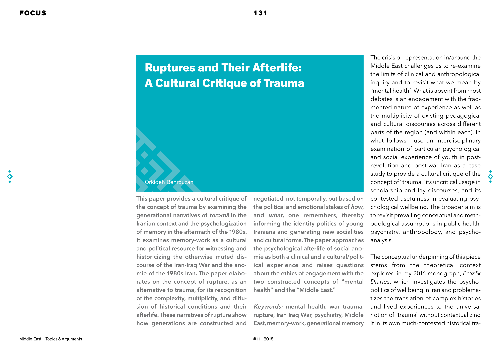Ruptures and Their Afterlife: A Cultural Critique of Trauma
This paper provides a cultural critique of the concept of trauma by examining the generational narratives of toromā in the Iranian context and the psychologization of memory in the aftermath of the 1980s. It examines memory-work as a cultural and political resource for witnessing and historicizing...
Αποθηκεύτηκε σε:
| Εκδόθηκε σε: | Middle East - Topics & Arguments |
|---|---|
| Κύριος συγγραφέας: | |
| Μορφή: | Artikel (Zeitschrift) |
| Γλώσσα: | Αγγλικά |
| Έκδοση: |
Philipps-Universität Marburg
2018
|
| Θέματα: | |
| Διαθέσιμο Online: | Διαθέσιμο Online |
| Ετικέτες: |
Προσθήκη ετικέτας
Δεν υπάρχουν, Καταχωρήστε ετικέτα πρώτοι!
|
| Περίληψη: | This paper provides a cultural critique of the concept of trauma by examining the generational narratives of toromā in the Iranian context and the psychologization of memory in the aftermath of the 1980s. It examines memory-work as a cultural and political resource for witnessing and historicizing the otherwise muted discourse of the Iran-Iraq War and the anomie of the 1980s Iran. The paper elaborates on the concept of rupture, as an alternative to trauma, for its recognition of the complexity, multiplicity, and diffusion of historical conditions and their afterlife. These narratives of rupture show how generations are constructed and negotiated, not temporally, but based on the political and emotional stakes of how, and what, one remembers, thereby informing the identity politics of young Iranians and generating new socialities and cultural forms. The paper approaches the psychological afterlife of social anomie as both a clinical and a cultural/political experience and raises questions about the ethics of engagement with the two constructed concepts of “mental health” and the “Middle East.” |
|---|---|
| DOI: | 10.17192/meta.2018.11.7798 |
 Publikationsserver
Publikationsserver